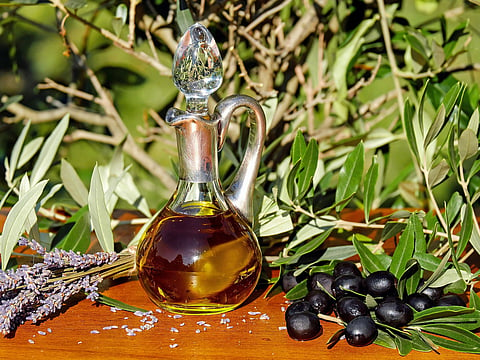
- LIFESTYLE
- FASHION
- FOOD
- ENTERTAINMENT
- EVENTS
- CULTURE
- VIDEOS
- WEB STORIES
- GALLERIES
- GADGETS
- CAR & BIKE
- SOCIETY
- TRAVEL
- NORTH EAST
- INDULGE CONNECT

Olive oil, often referred to as “liquid gold,” has been revered for centuries for its rich flavor, versatility, and numerous health benefits. Its significance dates back thousands of years, with ancient civilizations like the Greeks, Romans, and Egyptians embracing it not just as a food source but also for its medicinal, cosmetic, and even religious properties. Today, olive oil continues to be celebrated worldwide, standing as a symbol of health, longevity, and culinary excellence.
The roots of olive oil's importance can be traced to the Mediterranean region, where it has long been a dietary staple. The Mediterranean diet, known for promoting heart health and longevity, places olive oil at its core. It is packed with monounsaturated fats, which are known to lower bad cholesterol levels, thereby reducing the risk of cardiovascular diseases. Olive oil is also rich in antioxidants, particularly polyphenols, which combat inflammation, protect cells from damage, and have been linked to reduced risks of chronic conditions like cancer and Alzheimer’s disease. Extra virgin olive oil, the least processed variety, retains the highest levels of these beneficial compounds, making it the gold standard in both flavor and nutrition.
Beyond its health benefits, olive oil carries cultural and historical significance. In ancient Greece, olive branches symbolized peace and victory, while olive oil was used in rituals, as a base for perfumes, and to anoint athletes. The oil's rich golden hue and smooth texture made it a prized commodity in trade and a sign of prosperity. Today, it remains an essential part of Mediterranean cuisine, enhancing dishes with its robust flavor, whether drizzled over salads, used in marinades, or as a base for sauces.
The culinary versatility of olive oil is unparalleled. Its subtle, yet distinct taste can elevate a simple dish, while its high smoke point makes it ideal for sautéing, roasting, and even baking. But its uses go beyond the kitchen—olive oil is a natural moisturizer, frequently used in skincare routines for its hydrating properties, and it is also believed to strengthen hair and nails. Additionally, its anti-inflammatory properties make it a natural remedy for ailments such as arthritis.
As modern consumers become more health-conscious, the demand for high-quality, sustainably produced olive oil has surged. Producers are increasingly focusing on organic cultivation and eco-friendly practices, ensuring that this ancient ingredient continues to be both a nutritional powerhouse and an environmentally sustainable choice. From its origins in the groves of the Mediterranean to today’s kitchens and wellness routines, olive oil remains a timeless, invaluable asset in both culinary and holistic practices.